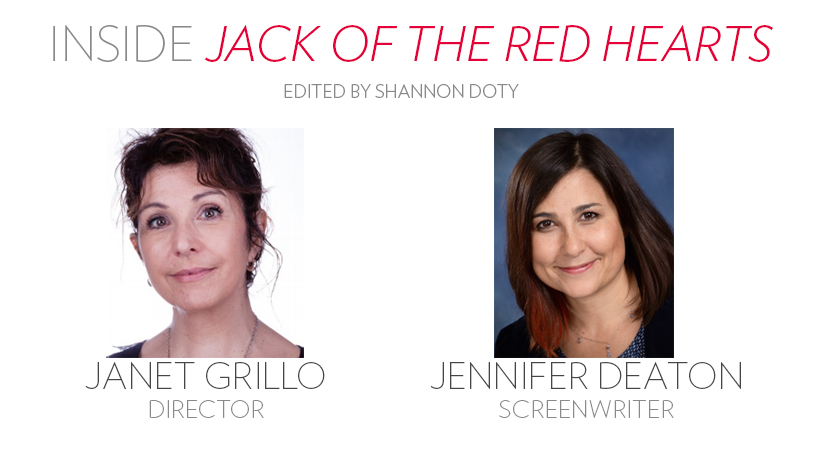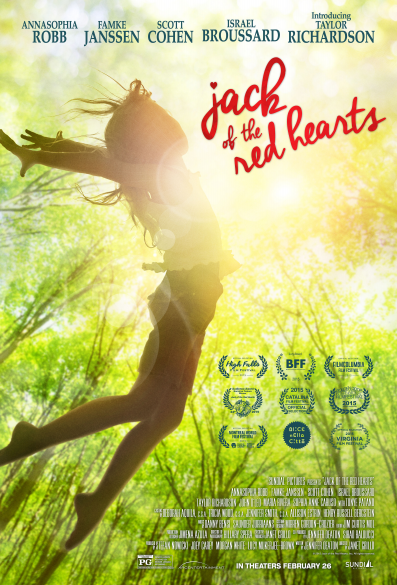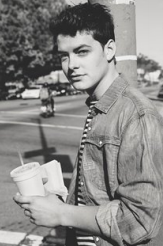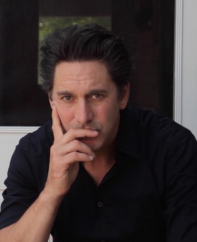Directed by Emmy award winning producer Janet Grillo and written by Jennifer Deaton, Sundial Pictures presents “Jack of the Red Hearts.” The film follows the life of a tough teenage runaway on parole, “Jack” (AnnaSophia Robb), who finds herself conning her way into a suburban home as the live-in helper for an autistic 11-year-old girl named Glory (Taylor Richardson). Despite Jack’s lack of experience and troubled past, she and Glory develop a unique connection. Glory’s desperate mother Kay (Famke Janssen) also bonds with the impostor seeing her as a surrogate daughter she can really talk to. Glory’s cute older brother Robert (Israel Broussard) falls in love. When the deception is exposed and the cops descend, loving father Mark (Scott Cohen) struggles to hold his family together as the pieces of this situation are reshuffled into a new, satisfying whole.
“Jack of the Red Hearts” opens on February 26, 2016 and is guaranteed a one-week run through to Thursday, March 3, 2016. If there is a robust turnout, they may extend the run. Please go support this poignant film that paints a realistic picture of the struggles and triumphs encountering those severely impacted by autism. Click here for a list of theaters screening the film.
View the theatrical trailer and continue below to read our exclusive interview with filmmakers Janet Grillo and Jennifer Deaton:

MHAF: What is the inspiration behind your film, “Jack of the Red Hearts?”
Deaton: I came to Hollywood in 1993. I had been writing scripts steadily, learning the craft, and doing other jobs to pay my bills. So, the fact that this movie is being made and received in the way that it is, and it’s such a personal story, inspired so much by my brother’s and niece’s experience, just makes it really, really sweet.
Grillo: Especially because her agents said that this is the one script that would never get made! (laughs)
MHAF: Well, you really showed them!
 Deaton: (laughs) I first wrote the script while I was working as a freelance script reader and receptionist at the same time. I did have an agent, and I applied for the Writer’s Arc Foundation fellowship, and my receptionist job allowed me to leave for a few hours every day to attend the requirements of this fellowship. That was when I wrote the first draft of this script. When I finished it, I gave it to my agent, and he basically said, “What do you expect me to do with this?” He saw no value in it whatsoever. There were no sex scenes, no explosions, you know. So, I thought there must not be any value in it and put it on the shelf.
Deaton: (laughs) I first wrote the script while I was working as a freelance script reader and receptionist at the same time. I did have an agent, and I applied for the Writer’s Arc Foundation fellowship, and my receptionist job allowed me to leave for a few hours every day to attend the requirements of this fellowship. That was when I wrote the first draft of this script. When I finished it, I gave it to my agent, and he basically said, “What do you expect me to do with this?” He saw no value in it whatsoever. There were no sex scenes, no explosions, you know. So, I thought there must not be any value in it and put it on the shelf.
MHAF: Then what happened?
Deaton: Fortunately, a few years later, I still cared very much about this story, and I prayed to God for a champion for the script. I was an Outfest screenwriting fellow on the jury selecting new screenwriting fellows, and one of my fellow jurors was a producer (who surprisingly worked in horror movies). She learned that I was a writer and asked to read something I had written. I had enough hope to give her the script, and she loved it so much that even though it wasn’t what her horror movie company was doing, she started sharing it far and wide.
MHAF: That’s wonderful. So, how did you and Janet end up connecting?
Deaton: Well, the script eventually came to these women who were like, “We know the director for this,” and they told us about Janet. Before I met Janet on the phone, they told me to watch her first feature film “Fly Away,” and when I watched it, I just dropped my face in my hands in tears because there was so much in that movie that I recognized. It was about a mother of a growing child who is severely impacted by autism, and I saw in that mother so many of the pains and struggles that my own sister-in-law had confided to me. So, I was like, “Yes.”
Grillo: Well, I was sent the script over the transom. Quite frankly, and Jennifer knows this well because she is a professional script reader for studios, 99.9% of scripts out there are not very good. So, I sat down to read this with very low expectations, but it was just such a strong piece of work. My first thought when I finished it was, “Whoever wrote this knows. This is definitely written from within the community with insight, understanding, and details that only someone inside of it would know.” I remember later Jen telling me that she’d spent a weekend taking care of her niece, Hannah, who is the inspiration for the character “Glory.” At the end of the weekend, she found herself sobbing in the bathroom with how challenging and difficult it was for everyone, just wishing that Annie Sullivan, “The Miracle Worker,” would walk through their door and help. She realized she couldn’t make that happen, but she could write it. So, the story of Annie Sullivan and Helen Keller is at the core of this as inspiration.
MHAF: What was the filmmaking process like, and how long did the film take to produce?

Grillo: Jennifer, Lucy Mukerjee, the producer, and I quickly became a team. We worked on the film together for about two years, developed it further, and then just got very lucky. We were, again, completely blessed to have Lucy, who met with a small production company based in New York, Sundial Pictures, that came on board very quickly. They read the script overnight, and the very next day said, “We’re in.” They brought the funding to the table – complete financing. So, within two years to the day, June 23rd, of the first conversation that Jennifer and I had on the phone, we were shooting the film. This doesn’t happen in independent film. It usually takes years and years of patchworking the funding together and pieces fall out and come together or don’t. We were also very blessed with a brilliant cast. Both AnnaSophia Robb and Famke Janssen are not only well known actors with loyal followings, but they’re brilliant actors and wonderful people. There was not a diva on the set.
Deaton: Besides me. (laughs)
Grillo: (laughs) No, everyone was very collaborative and hardworking, generous, supportive, and it was just a lovely time. We premiered the film at the Inaugural Bentonville Film Festival, cofounded by the actress and activist, Geena Davis. She started the festival to promote gender parity, to tell stories about women and girls. We premiered there so, lo and behold there’s a festival that gets created for movies just like ours!
MHAF: Sounds like you ladies really hit the jackpot with this thing!
Grillo: (laughs) Yes! Things were happening at every turn. So, we won the jury prize. On top of that, it is the only festival in the country – possibly the world, but certainly in the United States – that offers a distribution package to the jury prize winner. It’s actually more difficult to get meaningful distribution for an independent film than it is to make one. So, now, we have the opportunity to have “Jack of the Red Hearts” marketed and distributed in a meaningful way, which is extremely exciting. Then, we were also able to play in many more festivals here and abroad and totaled 11 awards altogether. But, most important has been the gratification of seeing the film in front of audiences of people not only those whose lives have been touched by autism, but the general public. We see how our story is universal – the story of loving a child, the challenges that love brings, the occasion that one has the opportunity to rise above one’s self to fill the needs of the other … It moves people and has an impact.
MHAF: That’s great. If you don’t mind, I’d like to shift gears a bit to the national dialogue surrounding autism. As you know, there are always new stories floating around in the media. Did the national conversation help shape the film? How?

Deaton: Well, at the time I wrote the film, I wasn’t aware of autism in the national conversation so much as I was aware of my “personal island.” I knew autism from my family and so much has changed – I mean, this was before anyone knew what gluten-free was. You couldn’t find gluten-free products anywhere. And, so, we felt that isolation where “it’s a rare thing that hit our family.” We were struggling to try everything because there were just so many different things being suggested besides dietary stuff but also things like joint compressions. I almost feel like the national conversation has caught up to our experience.
Grillo: Yes, that’s very well said. And certainly in the last decade, we’ve seen a surge of awareness. Now, unfortunately, the surge of awareness has everything to do with the increased diagnosis. Whether it’s an epidemic or not, and certainly there’s a debate, it’s a national health crisis. And, as a national health crisis, it’s incumbent upon us as a society, as a people, to understand it and to prioritize to meet the needs of this community, which is sadly growing in number. It’s not a static number; it’s an increasing number.
MHAF: That is so true. So, how is “Jack of the Red Hearts” changing the conversation surrounding autism, specifically in the film world?
Grillo: My strong feeling is that in the majority of narrative feature films, the depiction of autism has been largely that of the “quirky geniuses.” The Asperger’s-type profile. They’re either highly verbal, have some incredible skill set, and they seem like people that with certain supports could go forward and have an independent life. While certainly there is a percentage of the population on this wide and diverse spectrum that has those kinds of skills, aptitudes, and will to move forward independently, the vast majority will not. We must share in a clear and honest way what autism really looks like. If we’re not honest in depicting and sharing the needs of our community with general society, how can we ask general society to help us meet them? I feel quite a mission to say, “Hey, look at this. We need your help. Please understand us. Please grow a place in your heart for our kids and our families so that they can then grow a place in society. Because we are going to have to ask you to pull the lever and vote for legislation that’s going to cost you money to continue to meet these services.” And if we don’t have a compassionate, emotional connection to the problem, we’re not going to be concerned about solving it.
MHAF: Do you feel that educating the public is part of your role as filmmakers?
Grillo: Our opportunity as narrative filmmakers is to create an emotional bond. That is what narrative does best. What fiction does best is grow empathy. Movies are best when they are “empathy machines.” By building a connection in the experiential moment together in a dark room with lights and shadows flickering on the screen, we can help to grow our culture and society in a more empathic way. So, that’s a very strong motivation for me to tell this story. Also, as with in my other movie “Fly Away,” they both dramatize a child who is severely impacted – functionally non-verbal as opposed to the “Asperger’s genius.” It helps to dispel the myth, you know, that every autistic person is a genius. No, that is not the case.
MHAF: How are Glory’s struggles with communication represented in the film? And, Jennifer, what challenges did you face as a screenwriter in portraying this facet of Glory’s character?

Deaton: Part of being a screenwriter is that you want your audience to sympathize with your characters. If you have a character who, for whatever reason, often expresses what she’s going through in tantrums, you need to try to understand where that tantrum is coming from so it doesn’t just get annoying. In the script, I wanted the audience to see the world through Glory’s perspective. What was it in the environment that seems mundane to those of us with regular perception that was scaring her? Or so harsh that she’s having to defend herself from it or react to it? There’s a component in the film that are these Glory P.O.V. shots where we try to see the world from her perspective. To some extent, we approach understanding what she’s trying to communicate or what her behavior is trying to communicate.
Grillo: She’s functionally nonverbal. I believe firmly that that is one of the reasons few narrative films and TV shows take on such a character. It’s hard to dramatize somebody who doesn’t speak in a functional way. It’s hard to develop character with somebody who is so inaccessible. I feel like my opportunity as a filmmaker is that I’m coming from inside the community. I have a child who is very, very different. My child is mildly impacted and will be one of those kids who will live a pretty independent life. However, autism is a pervasive neurological problem. It’s like saying you’re “a little pregnant.” You can be three months pregnant or eight months pregnant – your entire system is different. It’s different in the same way but only to levels of degree. Every challenge that somebody who is more impacted has is there in a less impacted person just in a less overwhelming sense.
MHAF: So, how did your personal experiences with autism help direct the performances, particularly Glory’s?
Grillo: I felt like it gave me insight and opportunity to be able to go down this rabbit hole knowing this experience first-hand, as a parent. I could help shape the performance and guide this brilliant young actress, Taylor Richardson. We were working with her to sense what it was like inside her own body when she feels uncomfortable. The performance is very inner to outer. I never say, “Well, now, flap your hands!” It’s always about, “How are you feeling inside?” Also, very specifically, what is Glory thinking, feeling, and wanting? What is the purpose? What is her goal? What is she trying to achieve in what she’s expressing? What is she trying to say? Just like any other character, it’s specific and purposeful, but it comes out through a neurology that is organized differently. When she wants to express a need, it’s going to come out differently than you or I would express. But, it’s purposeful. It’s not, “Oh, well, here’s another tantrum, start flapping your hands!” No. It’s relational and in dynamic with these other people. And, so, she does have an arc as a character. We do see her progress.
MHAF: Did Taylor Richardson have any experience with autism prior to performing?
Grillo: I was auditioning young girls, and Taylor walks in. She knew nothing about autism, hadn’t done any research or prep. She just came in as a young actress reading this role, but there was something about her that was just so available and so fluid. So, we did some improv, and I felt like, “She’s my girl.” I sent her away for a week to do some research with a documentary that I helped produce called “Autism: The Musical,” also some home movies of Hannah, Jennifer’s niece, and some material to read. She came back a week later having internalized and incorporated a lot. We then did some more improvs, and she was right there with her performance. Her grandmother teaches in a public school, and there’s a child with autism in the school, so she spent a day following that boy. That was helpful to her, as well. Well, the rule of directing is “cast a brilliant actor.” (laughs) So, number one, cast a brilliant actor, and get out of their way! I give her tremendous credit.
MHAF: That’s wonderful. Also, Janet, is it true that you cast your son’s real-life preschool teacher in this film?

Grillo: I sure did. Yes, so my son’s first special needs preschool teacher is the wonderful, remarkable Donna Kennedy. It was my first experience with a special needs setting, and my son was her first student on the autism spectrum, so it was a very important experience for both of us. Donna then, because she’s an extraordinarily talented woman, has since become the Director of the entire school. So, we shot the last scenes in the school Glory interviews in the Gillen Brewer School, and I cast Donna Kennedy, who is the real-life Director of Gillen Brewer, to play the Director of the school. (laughs) I knew that she would be great.
MHAF: What types of common experiences among autism families do you illuminate in “Jack of the Red Hearts?” Also, do you touch on life after 21?
Grillo: This film is not concerned with life after 21. I’m concerned with it – my son’s 22. (laughs)
Deaton: And Hannah’s 17, so she’s right there.
Grillo: This child is 11, and that became very important as we were working with the actors because, as we all know, brain is plastic until death. It’s most plastic ages 1-3, and there’s a large drop-off after age 10. So, after age 10, the contours of who your kid is, who your kid is and isn’t, are much more defined, and it can be quite a crisis point for a family. Because, you know, with a child with autism, you’re in such a stage of fog and unknowing that growth and change can happen with early intervention. It becomes a challenge of “accept the things you cannot change.” So, the fact that she’s turned 11 is causing the family to have very differing expectations of what can happen next. It’s a critical moment for this person to enter their lives and bring her forward at a time where they are starting to really lose hope. In that way, we are pointing towards the forward arc, but not every movie can do everything, and the specificity of the situation is where you get your dramatic traction. So, no, we do not take on adulthood in this film. I am certainly keenly aware that it’s a big problem. It’s a big issue.
Deaton: I think all families, no matter where their kid falls on the spectrum, deal with that emotional strain of how their family or child is represented to outside eyes – that sense of being judged for the challenges they’re facing. There’s a scene where an administrator doesn’t understand that Glory is just speaking in an echolalia sort of way, and the mom has to say, “No, she’s not telling you she’s hurt, she’s just repeating that because you said it.” There’s also a moment in the dinner scene where they’re sitting around, and Glory is speaking some of her nonsense words, which are straight from my niece’s mouth in some cases. The outsider character says, “What is she saying?” And the dad quips, “Well, we think it has something to do with her views on conflict in the Middle East.” They’re so fed up with not knowing the answers to the questions of “Why is she saying what’s she’s saying?” that they just have fun with it.
MHAF: So many families are searching for ways to cope and ways to find joy amid all of the challenges.
Deaton: Sometimes so much hope and anxiety in these families can be put on these little milestones like: Can we get her into this school? Can we afford this therapy? That experience where – because every child is different – you feel like you’re the first one. You’re the pioneer trying to figure out which is the combination, that thing that will help your child.

Grillo: The only thing I would add to that is that the [interview at the school] is not a little thing at all in terms of the dramatic structure and stakes. Stakes are the values imbued in an event by the characters. When we are empathically connected to the characters and we share their values, we understand the tension and the high stake. So, this is a huge turning point in the life of this family. The potential and the future of this child and family really does rest in whether she gets into this school or not. It’s very high stake. It’s emotionally as big as an explosion.
Deaton: I think that’s exactly one reason why our main character, Jack, can come into this world, even though she has no experience. She’s not exhausted. The family, like the Kellers, like the Annie Sullivan/Helen Keller story, are exhausted. They have coping behaviors, you know? And Jack comes in with fresh energy and assumes, rightly or wrongly, a level of competence that the family might not.
Grillo: Thank you, Jen, for mentioning that because what she sees in the family dynamic is a family that has kind of collapsed into accommodating this child. One of the things that’s so hard is that, as a parent, you’re going to throw everything up against the wall to see what sticks. It’s hard. You’re not going to do a double-blind placebo test with your kid, so if you’re doing three things at the same time and your child’s getting better, you don’t really know which one is the cause or if any of them are. How do you evaluate the success? Something that Stanley Greenspan taught me is that every waking moment is a therapeutic opportunity, which, by the way, is an exhausting way to live. How do you construct a marriage, family life, parenting, etc.? It’s so unnatural when you’re waking up every day to be the primary therapist for 12 hours. This is a huge problem. On one hand, it seems to be compassionate, and there’s a way we as moms especially might coddle our kids – overprotect them. And then there’s a way it is the path of least resistance. Jen’s quite right in that Jack comes in, not with just a fresh perspective, but she’s “fresh horses” – she has the energy to take it on.
MHAF: Thank you very much to both of you for your time. I have one final question that I ask every parent or relative that I interview: What is your biggest hope for your loved one’s future? Your son and niece’s future?
Grillo: That’s easy – that he’s happy.
MHAF: And, Jennifer?
Deaton: What i really hope for Hannah is that her reading skills will continue to progress so that she can use assisted communication devices to help her interact.


 VisAbility Art Lab: CALL FOR ARTISTS IN THE DC AREA
VisAbility Art Lab: CALL FOR ARTISTS IN THE DC AREA



I need someone to try to write or make a movie on my autistic son Christian silence and cry for her how do we go about this thank-you for listening